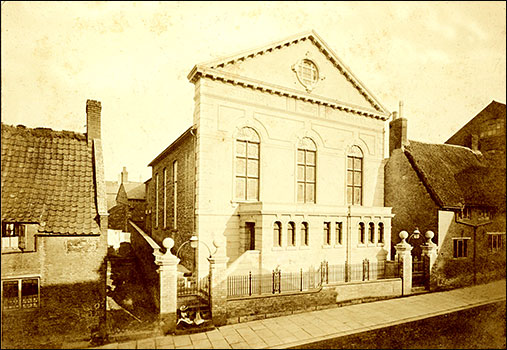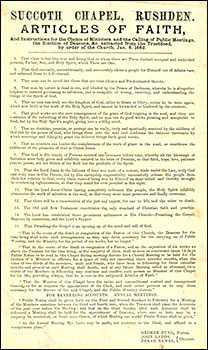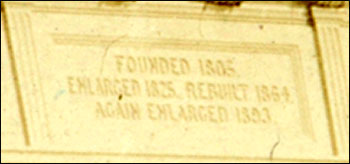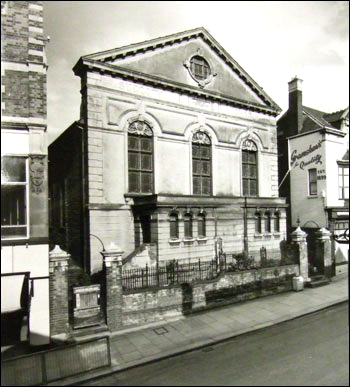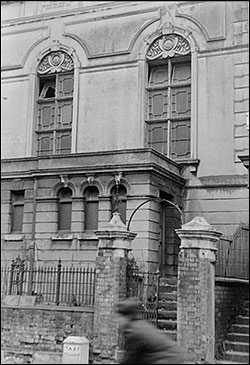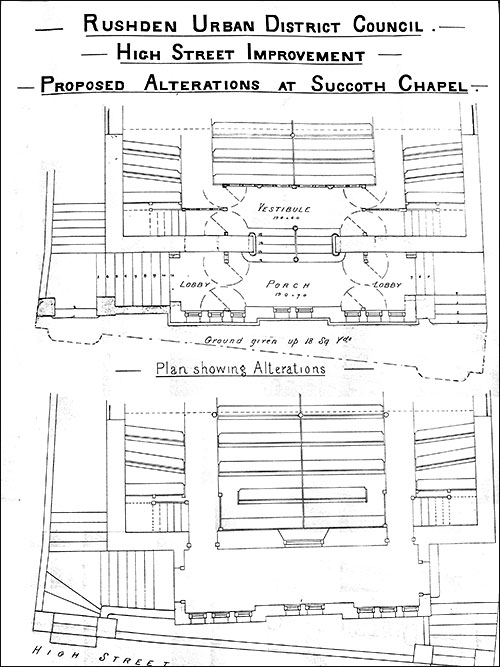|
||||||||||
|
The Succoth Baptist Chapel
|
||||||||||
|
||||||||||
They built a new chapel in the middle of the High Street in 1803/04 and it became known as the “Bottom Meeting”, the old church being then called the “Top Meeting”. A young Charles Drawbridge, just 21 years old, came to speak at the Top Meeting in 1826 and was afterwards invited to become pastor at the Bottom Meeting. He accepted and was their pastor for over 40 years. It was rebuilt and enlarged in 1862 and during the rebuilding the meetings were held in a large barn on the site where the Railway Station was later built. After the death of Charles Drawbridge there were several short pastorates, including James Crook. Whilst he was pastor, there was a dispute with the Trustees and the Sunday School leaders (see report below) which eventually resulted in a court case in August 1900. Soon after that James Crook took a group of worshippers with him to form the Zion Church and the Succoth congregation declined gradually until the church closed in 1957. The building was demolished in 1969. |
||||||||||
|
||||||||||
|
||||||||||
|
||||||||||
|
|
||||||||||
|
||||||||||
|
AN AMAZING DISPUTE AT THE SUCCOTH CHAPEL The Succoth Baptist Chapel at Rushden, originally known as Bottom Meeting, was the second Baptist church in the town, in the High Street, dating from 1800. During the late 1890's, a disagreement began between the Pastor and the Sunday School teachers. It came to a head in August 1900, and ended with a breach that could not be healed. Crisis was reached on Sunday, 5th August 1900. After morning service, a meeting took place, in which the Pastor, J. Crook, accused the Sunday School superintendent, Zerah Newell, of impeding him in his Christian work, and inciting others to do the same. By a vote of 24 to 6, he was expelled, some abstaining. Zerah Newell still had a voice in the management of the Church because he was a Trustee, one of the permanent managers. The constitution did not allow his removal. A meeting of the Sunday School teachers was called, which voted unanimously to support Newell. As they left, it was noticed that the rules of the school hanging on the wall had been altered. Some names, including that of Newell, had been erased. The Church Secretary, Charles Toms, circulated a letter, stating that the Deacons had appointed the Pastor, Crook, as superintendent of the Sunday School. On Saturday, 18th August, a lock was placed on the School door by persons unknown. One of the Trustees removed it, and the teachers entered. The same evening, a lock was placed on the gate leading to the Chapel, and a bolt was fixed to the side door of Chapel, intended to prevent the deposed superintendent and the teachers getting in to hold the usual Sunday School the next morning before the morning service. The teachers arrived to find all the doors locked. One of them got through a side door, by means of a key provided by one of the Trustees. The bolt on the inside had been left unfastened. Friends of the Pastor had taken other steps to try to prevent the Sunday School taking place. They had been round to many of the parents and informed them that no school would be held that week. However approximately thirty scholars did arrive, so a school was held, albeit with a reduced attendance. The school was all set to start, when the Pastor arrived. He expressed his disapproval of the proceedings. When more scholars arrived and attempted to come down into the schoolroom, he barred their way. He stood in the doorway and sternly asked them their business. "I shall not, by any means, allow you to enter". Zerah Newell and the teachers told him that they would not go away without holding their usual session of the school. There was a great altercation. One of the church members used his shoulder to thrust Mr. Crook away from the door. Words became even more heated, until finally, the Pastor left. The school then proceeded. At the morning service, the Pastor made some mild remarks about the incident, but otherwise nothing further was said about it that morning. However, at the evening service, towards the close of his sermon, Mr. Crook mentioned it again. There were disapproving interruptions. The Pastor shouted, "The business of the Sunday School shall no longer be conducted by one family!" A teacher shouted, "It is not!" "It is! You know what I say is true". "Half of what you say is untrue!" The Pastor was drowned out in the general shouting that ensued. There was an abrupt conclusion of the service with the singing of the Doxology. Nothing was said in public about this matter for a week, though we can be sure that much was said in private by both factions. A circular dated 13th August, was addressed to the Sunday School teachers but evidently intended for all Succoth members. Let Truth and Justice Decide! Succoth Baptist Chapel - To the teachers of the Sunday School Dear Brothers and Sisters - I am requested to inform you that we have appointed our Pastor, Mr. Crook, as Superintendent of the Sunday School connected with this church, for the time being, and that you must not transact any business in connection with the school, or elect any officers, without his consent. Signed on behalf of my brother deacons, CHAS. TOMS, Secretary". The teachers issued a statement in reply: "We the undersigned teachers of Succoth Chapel Sunday School, hereby resolve to carry out the rules of the school, and claim the right to choose our officers in accordance therewith... A lock was put on the schoolroom door, and a female sent round to the parents telling them the school would be closed for several weeks". Mrs. Crook gave a statement to the press, which was really her husband's version of the dispute, beginning with the confrontation of 5th August. "My husband went down to the chapel, a little after ten, and was naturally very surprised to find children and teachers in the school. He said he should not allow them in the chapel. It is the custom for the elder scholars, after a short lesson in the school, to take part in the chapel service. Some rough words were said, and one or two of the teachers endeavoured to throw my husband out. He told me afterwards that there were eight men there, and two of them tried to throw him out. Our son happened to go down to see what was happening, and he flew at one of the men. They turned on him, and he was knocked down. A policeman who had been standing outside was called in, but he declined to interfere. He said he had no authority, unless personal injury was done. The presence of the policeman did have a beneficial effect." |
||||||||||
|
The Rushden Echo, 27th May, 1904 CENTENARY OF SUCCOTH CHAPEL - A BIT OF RUSHDEN HISTORY For one hundred years now the Succoth Church, belonging to the Strict and Particular Baptist denomination, has been closely identified with the history of Rushden, the chapel having been erected in 1803. The building, the original cost of which was £208, occupies a commanding position in High-street. The centenary of the church has been celebrated this week. From the available sources, an interesting account of the church has been compiled, and this was read by Mr. J. Bennett at Tuesday night’s public meeting. After dealing with the erection of the building in 1803, he proceeded to state that the well-known Mr. Charles Drawbridge was invited to preach at the chapel, and ultimately became its minister in 1826. Mr. Drawbridge did not receive a fixed salary, and one person found him in lodging, another in meat, and another in bread. He resided at Wellingborough during most of his life, and drove over to Rushden to preach morning and afternoon, many coming from the surrounding villages to hear him, and often he would drive back to Wellingborough for the purpose of giving a lecture. In due course the building had to be enlarged, and in 1856 a believers’ baptism was held in an overflowing house. The congregation rapidly increased, and it was found necessary to make other enlargements, which were carried out in three months, the services meanwhile being held in a barn where the present Midland Station stands. CHARLES DRAWBRIDGE died on November 26th 1871, after over forty years’ work for the cause, and on November 30th he was buried in Wellingborough cemetery. The account also gives details of the formation of the Sunday school, and at the present time there are 77 scholars and 19 teachers. No fewer than 1,664 scholars have passed through the school since the schoolroom has been built. During the ministry of Mr. Palmer the imposing entrance to the chapel was erected at a cost of £400. The Pastor (Mr. E. Roe) preached on Sunday to good congregations. “The faithfulness of God” and “The protection of God over His Church” were the respective subjects with which Mr. Roe dealt in the morning and evening. Mr. J. E. Flegg, of London, who is connected with the denominational journals, took part in the centenary celebrations on Tuesday. In the course of his address in the afternoon, Mr. Flegg said that they must notice the progress that had been made when they compared the blind SUPERSTITIOUS WORSHIP of the priest of the past with the pure and simple Bible worship they now enjoyed. To-day there were those who would sweep away the truths of the substitutionary death of Christ and the fact of the resurrection, but his hearers must hold fast these truths. Tea was provided in the schoolroom, about 100 guests being present. A PUBLIC MEETING was held in the evening, Mr. Roe presiding. The Chairman said that would be a red-letter day in the history of the chapel. Addresses were given by Messrs. Hazelton (St. Neots), F. C. Burgess (Clifton), Flegg, and B. Cox. The latter, who is pastor of a large church at Little Rock, U.S.A., left Rushden 23 years ago, and is visiting Rushden on his return from the World’s Sunday School convention at Jerusalem. Last night Mr. Cox gave a most interesting lecture. Through pressure on our space we are compelled to hold over our report until next week.
|
||||||||||
